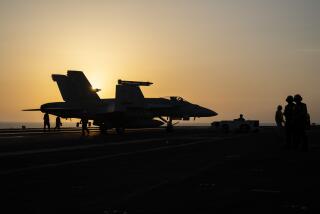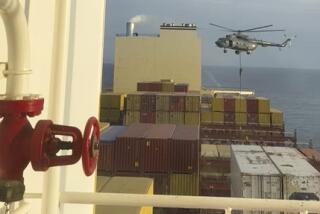Weinberger Discounts Iran Gulf Threat
- Share via
WASHINGTON — Defense Secretary Caspar W. Weinberger said Wednesday that he doesn’t think Iran will attack U.S. Navy ships in the Persian Gulf, despite the continuing threats voiced by the Islamic revolutionary nation.
Weinberger’s prediction came hours after Tehran radio broadcast a new threat warning that Iran might attack American nuclear reactors.
Weinberger told the House Foreign Affairs Committee that “in the past, Iran has assiduously avoided even the mere hint of a threat toward U.S. ships, either combatant or commercial.”
Decries ‘Violent Rhetoric’
“We do not expect that situation to change, Iran’s violent rhetoric notwithstanding,” he said. “We believe they will not launch any attacks on American ships.”
Weinberger’s prediction came as he and Adm. William C. Crowe Jr., chairman of the Joint Chiefs of Staff, spent a second day on Capitol Hill discussing U.S. policy in the gulf region, a major source of oil for the West.
President Reagan has promised to provide U.S. flag protection to Kuwaiti tankers, raising congressional fears that the United States might be drawn into the Iran-Iraq War. Kuwait is an ally of Iraq.
Attack Heightens Fears
The fears have been heightened by the May 17 missile attack on the U.S. guided missile frigate Stark by an Iraqi warplane that killed 37 sailors. Weinberger and Crowe both said Wednesday that they accept Iraqi explanations that the attack was a mistake.
Administration sources said Tuesday that the Navy’s Mideast Task Force in the gulf will temporarily swell in size to as many as a dozen warships by early July and then drop to a standing force of eight or nine to provide escorts for the Kuwaiti tankers.
Weinberger and Crowe refused to say publicly what the United States might do if Iran does strike U.S. ships, whether the vessels are Navy craft or the reflagged Kuwaiti tankers. U.S officials have said they would treat an attack on a reflagged Kuwaiti vessel the same way they would an attack on an American-owned ship.
Both Iran and and Iraq have been attacking tankers for the past three years, although 70% of those strikes came from Iraq, Weinberger noted.
Not a Free-Fire Zone
He challenged what he said is a public perception that the gulf is a free-fire zone. “On any given day there are approximately 400 ships in the Persian Gulf and since 1984 less than 1% have been attacked,” he said.
The Stark attack shows that “danger is always near,” Weinberger continued. “But it should not be allowed to distort appearances beyond reality. The actual threat to U.S. shipping in the Persian Gulf has not changed since March when we briefed members of the Congress on our reflagging initiative with Kuwait.”
Crowe voiced similar sentiments, testifying that “the gulf today is an uncertain place and can be dangerous, but it is not a war zone in the accepted use of the words.”
More to Read
Sign up for Essential California
The most important California stories and recommendations in your inbox every morning.
You may occasionally receive promotional content from the Los Angeles Times.













